

by John Helmer, Moscow
@bears_with
Death can be a coincidence, but not in the Russian aluminium business.
So when Dmitry Bosov died of a pistol shot at his home near Moscow on the evening between May 5 and May 6, and Anatoly Bykov was arrested by federal agents in Krasnoyarsk on May 7, everyone with well informed suspicion asked if there is a connection to a Kremlin political calculation made at the highest level.
Bosov’s death was announced officially by the Investigative Committee without Bosov’s name. “According to preliminary data of the investigation,” the prosecutors’ press release says, “on May 6, 2020 the body of a man with a gunshot wound to the head was found by relatives in the territory of the house in the village of Usovo. Next to the man ‘s body lay a Glock 19 Gen 4 gun. Investigators are currently working on the ground, examining and interviewing relatives. The circumstances and reasons for the incident are established.” The last sentence means both more and less than it says.
The Moscow Times, an English-language publication financed by the Dutch Foreign Ministry and by Bosov, said less.
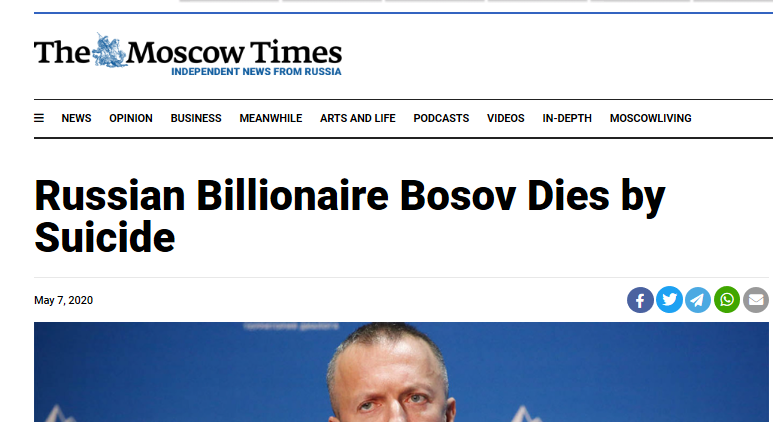
The Moscow Times (MT) has been jointly funded by the Dutch Foreign Ministry and by Bosov, through an Israeli friend of his, Demyan Kudryavtsev. They finance the Dutch father and son, Derk and Pyotr Sauer, to continue their campaign against the Putin administration; more details can be followed here. The MT version of Bosov’s death was selected from Moscow newspapers of the day before. To take over MT, Vedomosti and other Russian publications, Bosov financed Kudryavtsev through a network of cutout companies, with a combination of cash, Russian bank loans, and loan guarantees worth an estimated €25 million. Their plan was reportedly to create a multi-profile media holding Bosov intended to re-sell later, possibly to the Rosneft group of Igor Sechin.
Bosov had been living in a Beverly Hills, California, house he reportedly purchased for $30 million. But in April 2019, according to California court documents, the State Department cancelled his visa, and he was evicted and banned from returning. Bosov is not on the sanctions list of Russians issued by the US Office of Foreign Assets Control. Nor is Bosov listed in the US Treasury’s report of Russian oligarchs, issued in January 2018.
The State Department and the FBI appear to have acted against Bosov despite lobbying by an American employee of Bosov’s, Francis Racioppi Junior. He was a professional gunman who practiced his trade in Iraq, Djibouti, Somalia, and several states of Central Africa. He describes himself in court papers as “a decorated United States Army Special Forces combat veteran and graduate of the New York University Stern School of Business… an American military hero.” Racioppi also reports himself as a “contribut[or] to the FBI’s Domestic Security Advisory Council and the Department of State’s Overseas Security Advisory Council.”
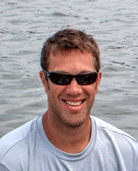
It isn’t known how much of this Bosov knew when he hired Racioppi (right) in April 2019 to run security for a group of companies investing in the California cannabis business. They fell out over Racioppi’s objections to Bosov’s business practices, and after Bosov rejected a balance-sheet cleanup plan Racioppi and Bosov discussed in January of this year. According to Racioppi, Bosov engaged him for an annual salary of $1 million, with an annual bonus of $350,000 and relocation expenses for a California home. He was then fired on March 25, allegedly as part of a Covid-19 shutdown scheme. Racioppi is now suing for his contract money on the ground that Bosov got rid of him illegally. Bosov and his Russian-American partner had been “malicious, oppressive, despicable, and fraudulent.”
According to Racioppi, “Defendant Bosov used Defendants Alltech Group and Goldhawk Investments Ltd. as one of many means by which to hide his involvement in a business that was violating and continues to violate Title 21 of the United States Code.” Title 21 is an omnibus statute covering drug labeling and marketing, adulteration, and drug control. Racioppi implies Bosov was acting criminally, but the lawsuit alleges civil offences.
Bosov’s spokesman told the Russian press at the beginning of this month “the facts given in the lawsuit do not correspond to reality, and the filing of the claim is due to a conflict of management when changing the management team.” That was on May 4. Bosov was dead shortly afterwards. The Russian police and prosecutors do not claim the US Government or its special forces played a part.
Bosov’s falling-out with Racioppi for less than $2 million is small beer by comparison with the fights and recriminations Bosov has had with major Russian business figures in the aluminium, oil and coal industries. Evidence about Bosov’s behavior in the 1990s was given by Boris Berezovsky and also by a representative of Roman Abramovich in the UK High Court in 2011, when Berezovsky was suing Abramovich to recover billion-dollar stakes in aluminium and oil companies between 1995 and 2000.
Berezovsky testified that Bosov was “his friend”. He also said Bosov had inveigled himself into negotiations for the sale of shares in the Krasnoyarsk Aluminium Works (KrAZ), one of the largest smelters in the world, which Bosov didn’t own and was in no position to sell for himself. “I remember well,” Berezovsky told the court, according to the transcript, “that Bosov insist that he is the dealer who provide for us a deal, and [Vassily] Anisimov to the contrary said he is the person who made this deal happen. And, moreover, Bosov later on even tried to — I invite him in the court here. If he wants to be paid, as he told, commissions, I said, ‘No problem, come to the court and prove that you are person who really made this deal happen, yes?’” Bosov never appeared in court to substantiate his claim.

Arriving at the High Court in London during the hearings in 2011, left to right, Boris Berezovsky, Roman Abramovich, Eugene Shvidler. Extreme right: Mikhail Chernoy. A close associate of Berezovsky’s living in London confirmed their relationship this week. He added about Bosov: “he was smart, self-sufficient. Maybe not very pleasant in personal communication, but this is a separate story…I don't like harsh people. He was distinguished by, let's say, peremptory judgments and direct statements.”
Another of Berezovsky’s witnesses testified: “Bosov was, he claimed that Badri [Patarkatsishvili], Boris and Mr Abramovich owed him commission for the acquisition of aluminium assets in 2000 and he wanted this discussion to be in the presence of Lev Chernoy because Lev Chernoy was also one of the sellers. And they discussed in front of me, people who were party to this transaction, who were sellers of these aluminium assets.”
Eugene Shvidler, a witness appearing for Abramovich, who bought the KrAZ shares in order to sell them later to Oleg Deripaska, told the court: “Three of us represented the purchasing side. The other gentleman here represented the sellers. Not all of them were actual sellers. I mean, they were sellers but not all of them had the assets. I’m referring to Mr Bosov.”
Shvidler meant, he went on to say, that Bosov was the frontman for the Trans-World Group (TWG), a leading London-based aluminium trader run by Simon and David Reuben. Bosov “was a seller, he didn’t have the assets. His assets were part owned — he was a partial owner but the assets owned by party 4 — no — whatever. By Trans-World Group.”
Deripaska’s lawyer testified that Bosov was not fronting for the Reuben brothers but for the Chernoy brothers, Mikhail and Lev, who had broken with the Reubens. “In Krasnoyarsk and in Bratsk the shareholders counted Chernoy and Reuben. And their share, if I remember correctly, Mr Bosov was simply managing those assets, or maybe perhaps just on Krasnoyarsk.” This was a courtroom courtesy — among Russian businessmen Bosov was suspected of being a deal cheat who would begin transaction talks on one side and end up on the other, depending on which side offered to pay him more.
ICE HOCKEY COINCIDENCE – CONNECTION ACCORDING TO THE LONDON PRESS
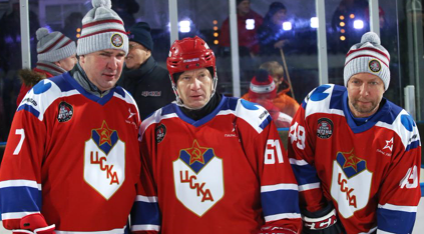
Left to right: Oleg Shargarodsky, a professional player with CSKA; nickel oligarch Vladimir Potanin; Dmitry Bosov. The London Daily Mail reported Bosov’s death may have been murder and connected the suspicion to the fact the “tycoon…played hockey with Putin [and] was 'obsessed with security' following business wars in Moscow and US”.
A spokesperson for the Reuben brothers told Forbes in Moscow this week they enjoyed a “very good working relationship with Mr Bosov from about 1994 to 1999. They are saddened to hear of his demise and offer his family and loved ones their sincere condolences.”
In mid-2013 Bosov’s business practices disqualified him when he attempted to sell shares in Siberian Anthracite, a major coalminer, on the London Stock Exchange. The story of the phoney prospectus concealing Bosov’s control was told here.
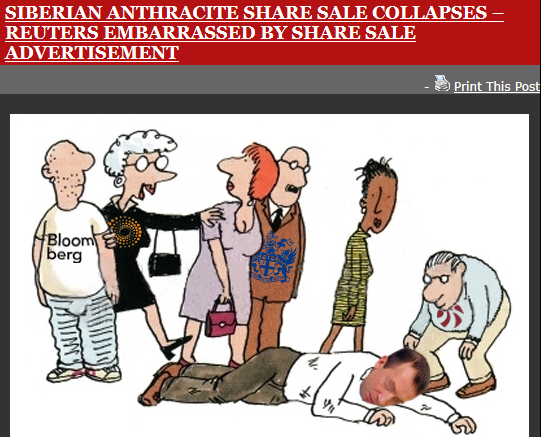
Source: http://johnhelmer.online/
“Bosov’s last two years have been difficult,” a friend of his told a post-mortem published by Forbes Russia. “He has spoiled relations with many people.” These have included Eduard Khudainatov, a Rosneft chief executive turned independent oil and gas operator; and Alexander Isaev in coal.
“Conflict was a constant companion of Bosov’s,” another friend told Forbes. “Dima needed a fight all his life.” The police told local reporters Bosov left no suicide note. Subsequent police leaks to the press have claimed that Bosov was known to play with his pistol; had fired a shot by mistake in the past; and may have killed himself by accident.
The business papers have speculated that his reach for his Glock was an impulsive action which went beyond plan. Kudryavtsev says otherwise. “I can’t imagine any reasons that could have pushed him to such a step…It seems to me that in the large business in which Dima existed, there are always conflicts with someone, then they stop, then new ones appear, and this was never a reason for him to change psychologically.” Bosov had been in self-isolation for protection against the corona virus, several friends have said publicly; they claim he was taking preventative medications which are known to have depressive mood or psychotic side effects.
Moscow speculation on the connection between Bosov’s death and Bykov’s arrest has reopened the involvement of both men in the conflict and killings which occurred in the mid-1990s over shareholding control of KrAZ, the Krasnoyarsk aluminium smelter, and the export trade for the smelter’s aluminium. With the collapse of the Soviet industrial system, KrAZ depended on cash advances from foreign traders which profited from the low rouble cost of smelter operations and the desperation of its management and the high value of the aluminium in the international market. Initially, a New York trader called AIOC and the Trans-World Group (TWG) dominated the trade; at the start TWG was controlled by the Reuben brothers in London and the Chernoy brothers in Moscow. In Krasnoyarsk city, Bykov established his own shareholding claim to the smelter, and with that a share of the metal export earnings. Additional Moscow sources of money were introduced from Vassily Anisimov and others.
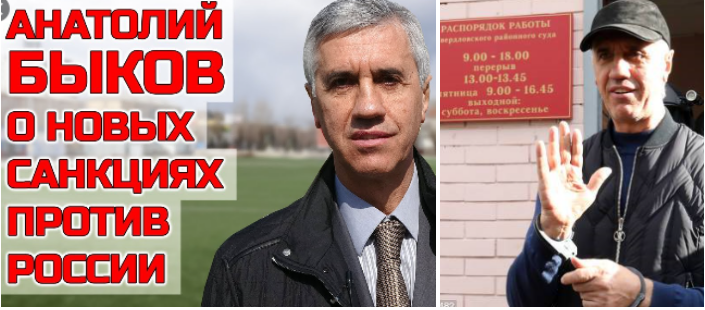
Anatoly Bykov has combined his regional business and national political campaigning with considerable success (left); under arrest on May 7 (right). Bykov has also successfully defended his KrAZ stake from Oleg Deripaska, winning a Swiss court judgement in 2004 for compensation of over $100 million; for details, read. The Bykov archive can be read here.
A direct participant in the trade at the time remembers this week: “Anisimov was no dummy. He went to KrAZ before the heavy shooting broke out, and gave back the Bykov (10%) and [Gennady] Druzhinin (10%) shares as well as the 17% shares of TWG. They agreed to divide the production of KrAZ into three parts; one-third to Chernoy, one-third to Bykov, and one-third to Anisimov. Anisimov brought in Bosov as a neutral party to administer the allocations and assure peace. Bosov also was there to try and control the coal and energy production the plant needed.”
The conflict over KrAZ was politically sensitive also because General Alexander Lebed threatened to defeat Boris Yeltsin in the 1996 election, and came close. Lebed then went on to become governor of the Krasnoyask region, and with financial backing from Bykov and others, he was a front-running candidate to succeed Yeltsin, and thus a target for the Yeltsin family and its allies. Yeltsin’s bid to survive in 1996, and the succession contest thereafter, disrupted the shareholding and cashflow arrangements at KrAZ. A renewal of the shareholding conflict in 1999 then triggered the new arrangements in which the Chernoy placeman Oleg Deripaska changed sides to join Abramovich, and ultimately buy Abramovich out – and all other Russian alunminium stakeholders. Part of that story was retold during Berezovsky’s losing lawsuit in London. The full story can be followed in the archive of Mikhail Chernoy’s attempt against Deripaska in the High Court.
Bosov was able to tell stories about the others, including Bykov, but his role was shortlived, and by the year 2000 he proved to be unconvincing and unneeded to the main KrAZ stakeholders; he was even less so when Deripaska consolidated his Russian Aluminium (Rusal) combination. Still, when Bykov was arrested last week, allegedly on the revival of the old murder conspiracy charges of the mid-1990s, there have been press reports claiming Bosov was under pressure to provide fresh testimony against Bykov, and that this pressure unhinged him and led to the suicide shot.
That Bykov’s arrest is a political move is more likely. This is the interpretation of the left-wing opposition to the Kremlin; that includes communist and nationalist groups descended from the old Lebed coalition. Although the prosecutors’ case against Bykov has little chance of surviving in court the statute of limitations and other obstacles, it can succeed in restricting Bykov politically. If that’s the nature of the conspiracy against Bykov, it didn’t need Bosov; his death for whatever reason is coincidental to that. The George Soros-funded opposition to the Kremlin has also had no need for Bosov in its version of the Bykov conspiracy.
Conspiracy theories the world over depend on turning concidences into connections. But in the politics of Russian aluminium, which Bosov left behind years ago, because Deripaska and all the others left Bosov behind, Bykov’s arrest cannot be a coincidence. What is more than coincidental is that not a single Bosov story being told now has mentioned Deripaska.











Leave a Reply